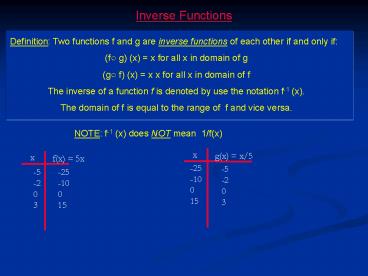Inverse Functions - PowerPoint PPT Presentation
1 / 11
Title:
Inverse Functions
Description:
(f g) (x) = x for all x in domain of g (g f) (x) ... The Inverse Sine Function. The inverse sine function, also called the arcsine function, is denoted by sin-1 ... – PowerPoint PPT presentation
Number of Views:1024
Avg rating:3.0/5.0
Title: Inverse Functions
1
Inverse Functions
NOTE f-1 (x) does NOT mean 1/f(x)
2
Inverse Functions
- Example Verify that f(x)-3x6 and g(x)-1/3x2
are inverses - Solution Find f(g(x)) and g(f(x)). If they
both equal x, then they are inverses.
g(f(x)) -1/3(-3x6)2 x-22 x
f(g(x)) -3(-1/3x2)6 x-66 x
3
ONE-TO-ONE FUNCTIONS
A function is one-to-one if for each y-value
there is only one x-value that can be paired with
it that is, no two ordered pairs have the same
second component.
4
Horizontal Line Test
- Used to determine whether a functions inverse
will be a function by seeing if the original
function passes the horizontal line test. - If the original function passes the horizontal
line test, then its inverse is a function. - If the original function does not pass the
horizontal line test, then its inverse is not a
function.
5
Finding the Inverse of a function
- The inverse of a function f can be found as
follows - Replace f (x) with y.
- Interchange x and y.
- Solve the resulting equation for y. If this
equation does not define y as a function of x,
the function does not have an inverse. Or
equivalently, the function is f is not a
one-to-one function and has no inverse - If f has an inverse, replace y in step 3 with f
-1 (x).
6
Sine Function Cosine Function
7
Inverse Trig Functions
- Goals
- Understand Domain/Range requirements for inverse
trig functions - Be able to calculate exact values for inverse
trig functions - Understand the composition of inverse trig
functions
8
The Inverse Sine Function
- The inverse sine function, also called the
arcsine function, is denoted by sin-1 or arcsin. - The function sin-1 has domain -1,1 and range
-p/2, p / 2 - In other words, y arcsin x, iff sin y x
9
The Inverse Cosine Function
- The inverse cosine function, also called the
arccosine function, is denoted by cos-1 or
arccos. - The function cos-1 has domain -1,1 and range
0, p - In other words, if y arccos x, iff cos y x
10
The Inverse Tangent Function
- The inverse tan function, also called the arctan
function, is denoted by tan-1 or arctan. - The function tan-1 has domain of all real numbers
and range -p/2 y p/2 - In other words, y arctan x, iff tan y x
tan (tan -1 x ) x for real numbers
tan -1(tan x ) x -p/2 x p/2
11
Summary
- With no restrictions, inverses of sin, cos and
tangent are not functions. - With restrictions
- Arcsin(x) ?
- Domain x-1 x 1
- Range? -p/2 ? p/2
- Arccos(x) ?
- Domain x-1 x 1
- Range ?0 ? p
- Arctan(x) ?
- Domain xx ? R
- Range ? -p/2 ? p/2































